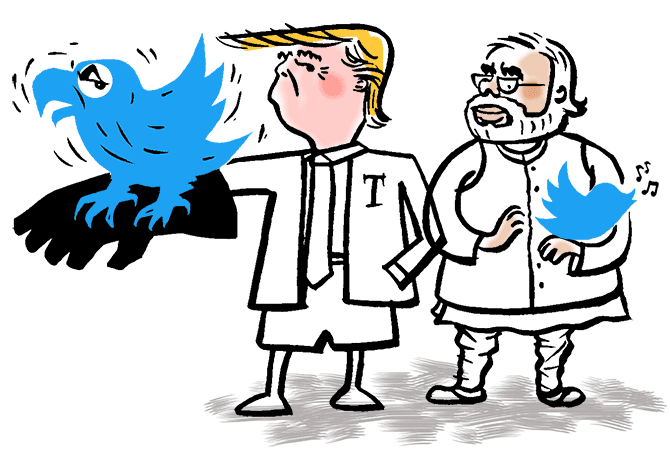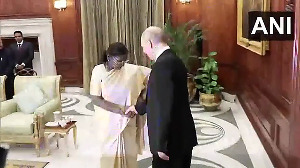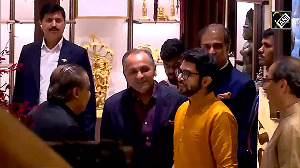The effects of creating 'baiting crowds' on social media, and their use by politicians, have diluted the civilising processes of parliamentary democracy, says Deepak Lal.

Illustration: Dominic Xavier/Rediff.com
After returning to London on June 5, there has been one shocking event after another.
A suicide bomber blew himself up at the entrance of a concert hall in Manchester as a hall full of teenagers exited.
Three jihadists drove a truck through pedestrians on London Bridge before disembarking with knives and stabbing and killing people in restaurants and pubs nearby.
Then on June 10, Theresa May's electoral gamble to turn her 20-point poll lead into an impregnable Commons majority spectacularly failed, as the electorate (again defying the pollsters) elected a hung parliament.
In the ensuing political chaos, accentuated by the upcoming Brexit negotiations, yet another shock -- heralded by an unseasonable heat wave in London as the 24-storey social housing Grenfell Towers burnt, with the upper floors becoming communal pyres.
An air of hopelessness and of portending doom and gloom hangs over London.
This is matched by hardening divisions between political opponents within and across parties. There is a rising hatred on all sides in public debates.
Emblematic of this was the latest edition of the BBC's Question Time where a heckler had to be evicted for being rude, butting into other people's points and talking over other people's argument before they had finished -- something which has also become commonplace on Indian TV debates.
In all this, we are regressing from the civilising process begun in the 16th century by Erasmus and Montaigne to tame the more primeval habits and passions of our species.
As Norbert Elias argued (in The Civilising Process) the evolution of civilised manners in the West was based on an amalgamation of aristocratic and bourgeois behaviour in post-Renaissance Europe.
The division of labour, monetisation and the accompanying differentiation of tasks and integration of different classes and groups in society required the personal internalisation of various forms of self-restraint on instinctual drives and passions. It is these civilised restraints which are being weakened and more primal passions are being resurrected.
Elias Canetti's Crowds and Power is useful in understanding this regression in public debate and social intercourse. He was particularly concerned with those instincts which arose when we were still small roving bands fending off numerous predators in the savannas.
His starting point is the fear of being touched: 'Man always tends to avoid physical contact with anything strange,' including when we are among other humans who are strangers.
It is only in a crowd that 'man can become free of this fear of being touched. That is the only situation in which the fear changes into its opposite.' The reversal of the fear of being touched belongs to the nature of crowds.
Canetti then distinguishes between different types of crowds and their attributes.
For my purposes, the most important of these is the pack. Of the four types Canetti distinguishes, the one most relevant is the 'war pack,' which differs from its hunting variant as it 'postulates a second pack of men' whose destruction is its goal.
The evolution of parliamentary democracy was part of the civilising process, which transformed the 'war pack' by taming its basic instinct for killing the other pack, but kept 'the psychological structure of opposing armies.'
The final parliamentary vote is decisive, and is all that is left of the original lethal clash of war packs. 'In a parliament there are, and can be, no dead.'
This is ensured by a two-fold parliamentary immunity: 'It operates both in relation to the government and its agents and in relation to other members… All members of parliament share in a common immunity. It is this measure of equality which makes them a crowd, and there is no distinction here between members of either party.'
This crowd, unlike the war packs, can be friends as their lives are not threatened by their losing a vote on supporting the losing conviction.
This civilised political process has been poisoned by the outcomes of the 2016 Brexit referendum in the United Kingdom and the United States presidential election. Why?
One important factor has been the widespread use of social media.
Canetti in his classification of crowds had identified the 'baiting crowd,' which goes back to the hunting pack. From the throwing of Christians to the lions in the Roman Coliseum to the collective executions by guillotine in the French Revolution, the importance of this form of primeval instinct cannot be doubted.
The disgust at collective killing in the West is very recent.
Nevertheless, 'today everyone takes part in public executions through the newspapers,' notes Canetti.
Often justified as part of the classical liberal liberty of free speech, Mill's principle of liberty is still preserved -- at least in the English Common Law -- by the victim having recourse to the law of libel. But the anonymous baiting of victims on social media does not allow any such redress.
Most egregiously amongst school children in England it has led to the formation of anonymous bullying packs on the internet. Their elders in the public eye are beset by unaccountable trolls. Whilst young school girls are reported to have been traumatised by their number of 'likes' and 'dislikes' on social media.
Canetti rightly called the 'baiting crowd' of the newspapers even worse than those of yore, as 'because of its distance from events it was a more irresponsible one.'
Also, 'it is the most despicable and, at the same time, most stable form of such a crowd. Since it does not even have to assemble, it escapes disintegration.'
Today's internet 'baiting crowds' are even worse because their anonymity does not allow any legal redress.
Much worse, the effects of creating 'baiting crowds' on social media, and their growing use by politicians, have led to the dilution of those civilising processes of parliamentary democracy, which had tamed the primeval instincts of war packs. Now, rival social media war packs make it more difficult for their representatives to compromise on contentious public policies, leading to the growing public hatred, political polarisation and dysfunction seen in both the US and UK.
This has been made worse as the newspapers lose their advertising revenue to the social media sites accommodating these 'baiting crowds'. They have countered by pandering exclusively to specific 'baiting crowds'.
Though always having been sympathetic to particular viewpoints in their opinion columns, newspapers of record such as The New York Times (NYT) prided themselves: 'to report the news in a fair and straightforward manner.'
'Today all that has changed,' as Michael Goodwin a former NYT reporter and now at the New York Post states in his 'The 2016 Election and the Demise of Journalistic Standards', (Imprimis, May/June 2017, www.Hillsdale.edu).
He sees the 2016 US election as the turning point when the NYT's top editor Dean Baquet explicitly abrogated the standard for fairness and keeping the news separate from opinion set by its legendary editor Abe Rosenthal, which was summed up on his tombstone as 'he kept the paper straight'.
My conclusion can be brief.
To restore the civility, which had tamed our basic instincts through the humanist civilising processes of post-Renaissance Europe, we need to take on social media recreating untamed 'baiting packs' and the 'war packs' based on our basic instincts, which are deleterious to the classical liberal social and political order and the civilising processes they represent.










